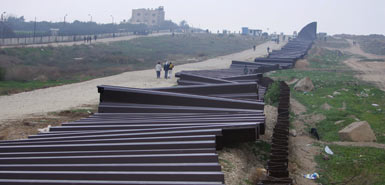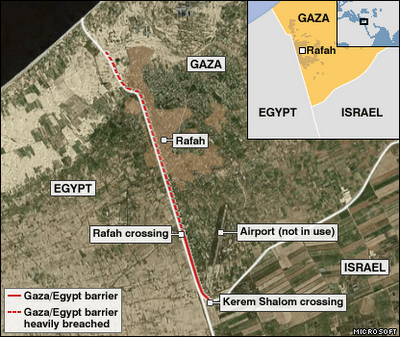From
U.S. News & World Report.
The remaining top al Qaeda leaders are increasingly isolated and have growing difficulty directing plots, according to Dell Dailey, a retired lieutenant general who serves as the State Department's counterterrorism coordinator. "We see them with much, much less central authority and much, much less capability to reach out," Dailey told a group of defense reporters this morning. "They can't centrally plan aspects from where they are located, whether it's Pakistan or not, and their franchise folks aren't very good." Dailey credited the response from the United States and other nations for taking out key al Qaeda leaders and disrupting their ability to plan, finance, and carry out attacks. According to Dailey, most of al Qaeda's recent activity has been carried out by franchises, using supporters already in place in countries like the United Kingdom and elsewhere. "The one area where al Qaeda has this centralized reach capability is in the media," he said. "They have not been able to build back their centralized, core strike capability." Dailey did say that al Qaeda's recent alliance with the Algerian-based Salafist Group for Preaching and Combat (which has been renamed al Qaeda in the Islamic Maghreb) is troubling. But he also said that the groups miscalculated with their recent attack on a United Nations office in Algeria. "For al Qaeda, taking on the U.N. is a bad move." {emphasis added) |
A few things which LTG (Ret) Dell Dailey states are key. But we need to first get back to the basics about fighting an insurgency. For basics, one needs to go back to
T. E. Lawrence and The Mind of the Insurgent. This article discusses the six principles of fighting an insurgency taken from Lawrence's time battling an insurgency in WWI.
1. A successful guerrilla movement must have an unassailable base. 2.The guerrilla must have a technologically sophisticated enemy. 3. The enemy must be sufficiently weak in numbers so as to be unable to occupy the disputed territory in depth with a system of interlocking fortified posts. 4. The guerrilla must have at least the passive support of the populace, if not its full involvement. 5. The irregular force must have the fundamental qualities of speed, endurance, presence and logistical independence. 6. The irregular must be sufficiently advanced in weaponry to strike at the enemy's logistics and signals vulnerabilities. |
The three most enduring principle which T. E. Lawrence espoused is an insurgency needs to have an unassailable base, passive support of the population, and presence in the population. On the counterinsurgent's side, they must be sufficiently weak in numbers so as to be unable to occupy the disputed territory.
In this context, let's examine LTG (Ret) Dailey's comments.
1. Key leaders are isolated: Al Qaeda (whether in Iraq, Afghanistan, Pakistan, or elsewhere) are isolated for several reasons. First, because of their extremism and indescriminate killing of fellow Muslims, in many areas where they had/have a presence they are losing the passive support of the population. At a microcosm level, this is what happened Al Anbar with the "Awakening" movement of Sunni tribes. This "Awakenig" movement pushed them out of Al Anbar, their unassailable base in Iraq to such an extent that Al Qaeda in Iraq no longer has a significant presence in this region from which to terrorize and subdue the population, hence causing a loss of passive support.
This same dynamic is seen in Afghanistan to a lesser extent and is most notable in
Mula Qasa, the town which was recently liberated by the Afghan National Army and Coaltion forces. In addition, the ex-Taliban leader, Mullah Abdul Salaam,
became disfranchised with Al Qaeda and is now in charge of the district. In Mula Qasa, Al Qaeda has lost an unassailable base, the passive support of the population, and its presence.
Finally, this same dynamic is becoming more prevalent in Al Qaeda's largest unassailable base, the FATA region in Pakistan. With the recent assassination of Bhutto and the ongoing suppression and killing of fellow Muslims, Al Qaeda (and the Taliban) are losing the support of the population. The Pakistani Army has recently established a presence in the region, limiting Al Qaeda's (and the Taliban's) presence in the region.
What used to be a region squarely under Al Qaeda's control from which it could launch operations worldwide is now threatened which brings us to another back to LTG (Ret) Dailey's comments.
2. "They can't centrally plan aspects from where they are located."
For all the reasons noted above, Al Qaeda's ability to centrally plan operations is extremely limited. Their presence in Iraq has been signifcantly degraded. In Afghanistan last year alone,
4500 militants were killed Several more were wounded, effectively taking them out of the fight. Strategically significant towns, such as Mula Qasa with its huge cache of refined opium (cash for the insurgent), have been lost. Loss of key terrain is also seen in Somalia and Indonesia. With the attack on the UN in Algeria, Al Qaeda repeated the same mistake it made in all other areas and will lose support in this region. Now, their last unassailable base, the FATA region in Pakistan, is under attack. It is hard to focus on operations outside your area of operations when your area of operations is under attack. Similarly, it is hard to gather support when your operations have at best resulted in the status quo and at the worst, a complete rout of your forces which bring us to the third significant comment from LTG (Ret) Dailey.
3. "Their franchise folks aren't very good." Al Qaeda in Iraq, Al Qaeda in the Islamic Maghreb, the Taliban, or the Islamic Courts all have a habit of disenfranchising the very population they need support from, which causes them to lose their passive support, loss of presence in these regions, and finally their unassailable base as the population with help from military forces expel them from their stronghold. While the cycle is in different stages in all these areas, the cycle is the same and stems from Al Qaeda wanting to create a single Caliphate in a world in which people associate themselves as Iraqis, Algerians, Afghanistanis, Somalis, or Pakistanis. In addition, while these people are Muslim, they all have different aspect of beliefs within the Muslim religion and most do not share the extremist views espoused by Al Qaeda.
4. We finally go to LTG (Ret) Dailey's last comment. "Dailey credited the response from the United States and other nations for taking out key al Qaeda leaders and disrupting their ability to plan, finance, and carry out attacks." This comment ties in with T. E. Lawrence's last principle above. On the counterinsurgent's side, they must be sufficiently weak in numbers so as to be unable to occupy the disputed territory. Established nations, such as Saudi Arabia, Indonesia, and Phillipines, have enacted systems and rules which significantly limits Al Qaeda's activities and freedom of action. Politically changed nations, such as Iraq and Afghanistan, are rebuilding armys and taking the fight to Al Qaeda directly. Other established nations, such as Pakistan, now see Al Qaeda as the threat that it is and are putting forces against it to counter its influence.
Al Qaeda's ability to occupy disputed territory has been significantly decreased since 9/11. Nations across the globe have seen what Al Qaeda does when it occupies a region or a state. They see it everyday in Iraq, Afghanistan, Pakistan, and Algeria. No nation wants Al Qaeda within its borders disrupting it society and decreasing its political and economic stability.
This leads us back to LTG (Ret) Dailey's orginal comment and T. E. Lawrence's principles. "The remaining top al Qaeda leaders are increasingly isolated and have growing difficulty directing plots." Whereever Al Qaeda occupies a region, they enact Sharia law, initially welcomed by the population resulting in
passive support. Later they begin to terrorize the populous as stricter forms of Sharia law are enacted. In turn, the populous, whom Al Qaeda depends on for passive support, withdraws this support. This action by the populous causes Al Qaeda to increase it reign of terror, killing innocent Muslims. Over time, populations, typically with outside military assistance, rise up and kick Al Qaeda out of their region. Al Qaeda
loses presence and hence influence in the region (
unassailable base). These "Awakening" groups, Concerned Local Citizens (CLCs), tribes, peoples, or governments band together to increase the counterinsurgents numbers and
decrease the disputed territories Al Qaeda can occury in the future.
It is for these reason that Al Qaeda in Iraq is being/or is defeated. It is for these reasons that the Taliban cannot retake Afghanistan and in fact are losing ground and support. It is for these reasons why Al Qaeda and the Taliban are facing hundreds of thousand of regular army troops and frontier corpsmen in the FATA region of Pakistan. It is for these regions why Ethiopia stepped into Somalia.
Al Qaeda is on the wane. Freedom is on the march.
Muslims the world over, once intent on helping Al Qaeda with support, an unassailable base, and presence in their states against what they considered a imperialistic United States are beginning to see firsthand what the Iraqis in Al Anbar saw two years ago. Al Qaeda is nothing but a bunch of unholy, sadistic extremists who violate Islamic principles by killing innocent Muslims as they enact stricter and stricter Sharia law on the populous.
Due to the Long War, Muslims the world over are seeing Americans firsthand and not the America portrayed on SITCOMs and in movies. Muslims are seeing America's greatest ambassadors, young American Soldiers and Marines who embody a warrior ethos respected in this region and the world over. These warriors are dying while battling Al Qaeda to spread to the rest of the world those unalienable rights written down by our founding fathers more than 200 years ago, Life, Liberty, and the Pursuit of Happiness. Al Qaeda only delivers, Death, Subjugation, and Despair.
Far from America being further branded as an imperial power seeking to control the world, America is becoming the savior of many peoples and nations delivering freedom and in some cases democracy through its young ambassadors, Soldiers and Marines. President Bush's bold move to plant the seeds of democracy in the center of Middle East and in Asia are having and will continue to have far reaching consequences. Namely, it will result in the decline of tyranny in "
Non-Integrating Gap" countries. In time, these countries will move closer to democracy and therefore freedom. Given more freedom, individuals in these countries will increase their standards of living and begin to contribute to the world economy. Instead of being destructive members of society, they will become productive members of society and share in those unalienable rights given to all men and women by their Creator
Labels: Afghanistan, Al Anbar, Al Qaeda, Al Qaeda in Iraq, Iraq, Pakistan




